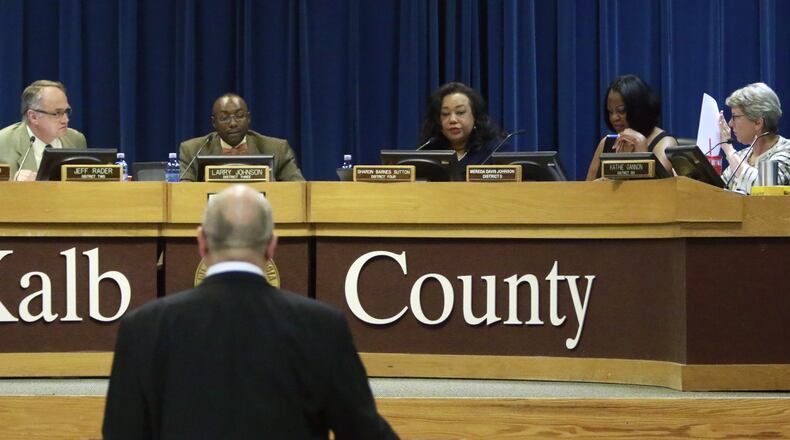About DeKalb’s proposed sales tax
DeKalb County was considering asking voters to approve paying an additional 1 percent sales tax for road repaving and other infrastructure. The proposal, if approved, would have raised $550 million over the next five years, but it didn’t pass the County Commission last month.
Commissioners voted down the proposal after they learned it could have the unintended consequence of raising residents’ property taxes.
An ambiguously worded, two-page piece of state legislation doomed DeKalb County's $550 million effort to pave bumpy roads, renovate moldy fire stations and upgrade parks.
No one caught the problem, which would have triggered an unexpected property tax hike, until it was too late to correct. Not state lawmakers, Capitol lawyers, county lobbyists or election officials.
How could everyone misread the legislation until the last minute?
It came down to one poisonous word: “tolled.”
Faced with a choice of raising property taxes or going back to the Georgia General Assembly to get the wording fixed, the DeKalb Commission voted to kill the special purpose local option sales tax (SPLOST) proposal until next year.
“We really believed we could have gotten this accomplished until we saw that one little word,” said DeKalb Commissioner Larry Johnson before last month’s vote. “I’m not happy, but this too shall pass.”
That perplexing word was contained in House Bill 596, which was intended to preserve a tax break enjoyed by more than 57,000 DeKalb households that receive a property tax exemption to offset increases in their assessed home values. If the SPLOST is approved, the tax break “shall be tolled,” according to the bill.
Legislators apparently didn’t realize that “tolled” meant the tax break would vanish. In legal language, “tolled” means “to delay, suspend or hold off the effect of a statute,” according to The People’s Law Dictionary. State lawmakers meant for the legislation to do the opposite, keeping the tax break in place along with the SPLOST.
“It was an error, and it’s our fault,” said Sen. Fran Millar, R-Atlanta, who shepherded the bill through the Senate. “That was not my understanding of what the bill did.”
The sponsor of the bill, former Rep. Mike Jacobs, R-Brookhaven, declined to comment. Jacobs, who is now a State Court judge in DeKalb, said through an aide he didn’t want his thoughts on the matter to be misconstrued as legal advice.
“There are parts of the system that are designed to help catch this, and nobody caught it,” said Rep. Scott Holcomb, D-Atlanta, a co-sponsor of the bill. “I remember reading it, and it didn’t jump out at me at that time.”
The legislation passed the House and Senate in March 2015, and then Gov. Nathan Deal signed it a few weeks later. The measure requires voters’ approval in this year’s November election, continuing the property tax break that has been in effect since 2007. Because the bill’s impact on SPLOST wasn’t discovered until last month, state lawmakers can’t change its language until next year’s legislative session.
When they do return to the Gold Dome in January, several state lawmakers have said they plan to work on new legislation to change the law so that, if DeKalb’s SPLOST passes next year, residents won’t lose their tax break.
Even before the problems with HB596, there was no guarantee the DeKalb Commission would have agreed to put the SPLOST proposal on the ballot or that voters would have approved it.
Alice Bussey, a south DeKalb resident who supports the SPLOST, said she hopes the proposal is successful. Bussey served on a citizen panel that crafted a list of projects that would have been funded over the next five years.
“At every level, we need citizens to ask more questions and be engaged,” Bussey said. “We elect these folks, and we need to make sure we question them. … It’s important for us to do it right and make sure the public has a good understanding. It’s not like it’s delayed forever.”
Though commissioners recognize the need for road repairs, they differ on whether other projects, like a new DeKalb government center, are necessary. City residents also complained that repairs to run-down county facilities within their borders weren't included in the county's project list.
DeKalb Commissioner Kathie Gannon said she hopes for a “silver lining” by delaying SPLOST until next year. The project list could be reviewed, and state legislators may decide to rework how projects are funded so that countywide facilities are given priority, a move that could minimize disputes between city and county governments.
“We were all hopeful that we had found a method to fund our road repaving/transportation backlog and begin to address other needs,” Gannon wrote in an email to constituents. “Plan B is to go back to the Legislature and have the legislation fixed.”
About the Author
Keep Reading
The Latest
Featured





